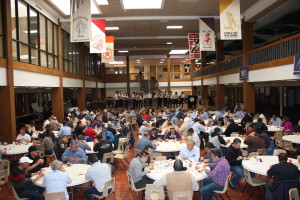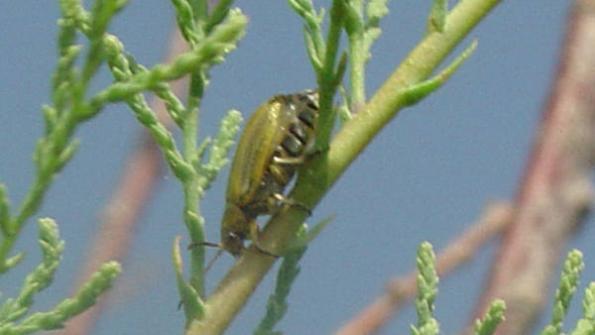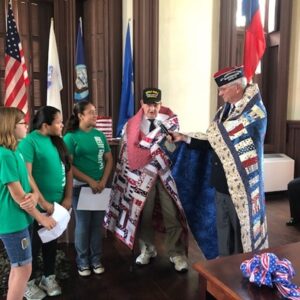The Integrated Pest Management Program of the Texas A&M AgriLife Extension Service provides research-based information and education for agricultural producers, agribusiness, consumers and citizens in the urban areas. The IPM Program disseminates expert, reliable, and current educational information in the areas of integrated pest management.
The IPM Program offers education that transfers new knowledge and technologies from research to users, enhances communities and the environment, and enables individuals to improve the quality of their lives through improved decision-making. Research is an integral part of this program whereby demonstrations in agriculture are conducted every year to determine the IPM practices needed by producers to increase yield and profit and reduce conventional pesticide use.
The Integrated Pest Management Agent serves the Agricultural and Urban clientele of El Paso County and Hudspeth County. He is supported by Extension Specialists who provide current research applications and educational material. These Specialists are located on the Texas A&M University campus and at district research and extension centers across the state.
TDA AGRICULTURAL APPLICATOR TESTING:
How to Obtain a Private Applicator License
STEPS TO BECOMING A PRIVATE PESTICIDE APPLICATOR
Step 1: Complete a Private Pesticide Applicator training session FIRST. Contact your county Texas A&M AgriLife Extension office for training opportunities.
o You may purchase training materials from certain County Extension Offices, via mail in order form (PA-1405) at www-aes.tamu.edu, or call (979) 845-1099 and we can take you order over the phone with a Master Card or Visa.
o You can obtain your Private Pesticide Applicator training session from your County Extension Agent, or you can obtain the training online for $75 by registering here.
Step 2: Upon completion of the training, a Training Verification form (D-1411) will be provided to the applicant (form provided by County Extension Agent or trainer).
o Applicants should keep the yellow copy for their records.
o The white copy (original) should be mailed to the Texas Department of Agriculture (TDA) with the Private Pesticide Applicator license application form (PA-400P).
Step 3: The applicant needs to obtain a hard copy of the Private Pesticide Applicator license application form (PA-400P) from TDA, or by clicking the link. (Website: www.TexasAgriculture.gov or Phone: 1-800-835-5832 or 512-463-7622).
Step 4: Submit the completed Private Pesticide Applicator application form (PA-400P), license fee of $100, and the white (original) copy of the Training Verification form (D-1411) to TDA for processing.
Step 5: When the license application is accepted, TDA will send the applicant a letter in the mail with their Account Number. This Account Number is the number the applicator will use to register and schedule the Private applicator exam with PSI
Step 6: Applicants can go to PSIexams.com or call 1-800-733-9267 to schedule an exam at one of 22 locations around the state. PSI staff cannot provide licensing advice or information.
o A Pesticide Licensing Examination Candidate Information Bulletin is provided at the PSI website to assist the applicant with the exam scheduling process.
o The private applicator will pay $64 per exam.
o There is a 24 hour waiting period to take a repeat exam.
o PSI will provide a confirmation number and testing location information.
Step 7: Upon completion of the exam, the testing center will provide test results immediately. A passing grade is 70% or higher.
Step 8: PSI will send exam scores to TDA daily. If all licensing criteria are met, TDA will issue the license.
Important: If an applicant has any questions about licensing or exam categories, please contact TDA at 1-800-835-5832 or 512-463-7622. Texas Department of Agriculture – Agriculture Pesticide Program | P.O. Box 12847, Austin, TX 78711 | phone 800-TELL-TDA.
To order the pesticide applicator training manuals please visit: AgriLife Study Manuals.
UPCOMING PROGRAMS:
SOUTHWEST BUGS
Is a collection of photographs of insects, spiders, and other arthropods that can be viewed as thumbnails that open into larger pictures. This website was originally called “El Paso Bugs” and later rebranded as “Southwest Bugs” to include species from nearby states; primarily New Mexico and Arizona. Photography by Dr. Salvador Vitanza and collaborators.
To view SOUTHWEST BUGS (click here)
Information on Disinfectants
Disinfectants are Pesticides – So Use Safely (1)
By: Dr. Mike Merchant
Posted: 27 Mar 2020 08:41 AM PDT
IPM NEWSLETTERS
YEAR 2020:
1. Far West Texas Agriculture Issue 1 Volume 1 Including COVID-19 Information
2.Far West Texas Agriculture Issue 2 Volume 1
3.Far West Texas Agriculture Issue 3 Volume 1
4.Far West Texas Agriculture Issue 4 Volume 1 (1)
YEAR 2016:
- February 5- Results of the 2015 El Paso Upland and Pima Cotton Variety Field Trials (yield and fiber analysis). Results of pecan bacterial leaf scorch sampling. Invasive pests detected in El Paso County for the past 6 months.
YEAR 2015:
- January 31– Results of the 2014 El Paso Upland and Pima Cotton Variety Field Trials (yield and fiber analysis). Cotton plant stand density test.
- April 6 – Texas entomology loses Dr. Mark Muegge. 2015 El Paso Pesticide Applicator Training. Care and management of trees in the trans-pecos. IPM of medically important arthropods.
- April 30 – Cotton field evaluations. First captures of pecan nut casebearer (PNC) moths in the region. Illustrated example of PNC prediction.
- June 10 – Cotton heat units. Upcoming second generation of the pecan nut casebearer. Blackmargined and black pecan aphids. Flea beetle outbreak in El Paso.
- June 18 – Cotton: damping off, cotton aphids, herbicide drift, and poor control of lambsquarters using glyphosate. Pecan: 2nd-generation PNC moths. Blackmargined aphids surpassed action thresholds.
- July 2 – Lygus bugs are increasing and need to be monitored frequently. Beneficial insects at high population levels. Second-generation pecan nut casebearer moths tapering off. Cotton variety trials plot maps.
- July 24 – Outbreak of Southwestern cotton rust in Fort Hancock. Bollworm moths most active from July 14 to 17. Pecan aphids are starting to build up. Monsoon rains have resulted in greater abundance or activity of ants , termites, flea beetles, June beetles, ground beetles, and the Western grapeleaf skeletonizer.
- August 28 – Less incidence of Southwestern cotton rust. Cotton aphids are increasingly abundant. Difference between parasitized and normal blackmargined aphids. Pecan bud moth and sugar cane aphids found in NM for first time. Possible red imported fire ant found in El Paso.
- September 22 – Pecan bacterial leaf scorch identified in Arizona and New Mexico. Large populations of cotton aphids. Red imported fire ant confirmed in El Paso County.
YEAR 2014:
- January 28 – Results of the 2013 El Paso Upland Cotton Variety Field Trials.
- March 17 – Results of the 2013 El Paso Evaluation of the Efficacy of Selected Insecticides on Pecan Aphid Population Densities. Summaries of the 2014 El Paso Pesticide Applicator Training Workshop.
- April 2 – Farm Bill. Pecan nut casebearer monitoring program. Summaries of the 2014 Western Pecan Growers Association Conference in Las Cruces, NM.
- April 16 – Soil temperatures for planting cotton. Pecan nut casebearer boring shoots in young pecan trees. Leaf curling in pomegranate. Tamarisk beetles active in Kansas and North Texas.
- April 24 – First pecan nut casebearer (PNC) moth captures in El Paso Lower Valley. Attached PNC Forecast brochure.
- May 12 – Pima and upland cotton variety trials. Cotton plant stand density trial. Pecan nut casebearer (PNC) damaging young pecan trees. Current PNC population levels.
- May 28 – Cotton plant stand densities. Differences in capture efficiency between the “Mexican” and the “standard” PNC pheromone lures. First saltcedar beetles in the region.
- June 6 – Cotton heat units. Second generation PNC. Blackmargined pecan aphids at treatment levels. Saltcedar beetles absent in El Paso. June beetle and its parasitoid.
- July 31 – Bollworm and Lygus on cotton. PNC and aphids on pecan. Increased abundance of the Subtropical Tamarisk Beetle on saltcedar plants in Far West Texas and New Mexico.
- August 15 – Increasing population levels of fall armyworms, bollworms, Lygus bugs, pecan aphids, and whiteflies. Entomological ID challenges.
- October 17 – Outdoor burn ban. Lowest blackmargined pecan aphid population in recent years. Cotton harvest aids field trial by Kerry Siders, AgriLife Extension Agent-IPM.
- December 19 – El Paso Pesticide Applicator Training to be held on Feb 10, 2015. Partial results of the El Paso 2014 Pima and Upland cotton variety trials. Pima cotton plant stand density evaluation.
Newsletters from the previous 4 years
KTEP-Radio show “Good to Grow”: Saltcedar Biocontrol in El Paso. Aired on September 13, 2014
Got bugs? Insects in the City is where you can learn more about common insects found around your home and landscape. Check out our fact sheet section for practical information on a variety of insect topics. Not sure what’s bugging you? Pest Wizard will help you name that insect or spider.
ABOUT TEXAS A&M AGRILIFE EXTENSION SERVICE:
[youtube]http://youtu.be/ur_MnrrbU0E[/youtube]
Contact:
Joel Arce, M.S.
Extension Agent-IPMAscarate Annex
301 Manny Martinez
2nd Floor
El Paso, TX 79905
Phone: (915) 771-2354
Fax: (915) 771-2356
Email: Joel.Arce@ag.tamu.edu
ABOUT THE AUTHOR:







